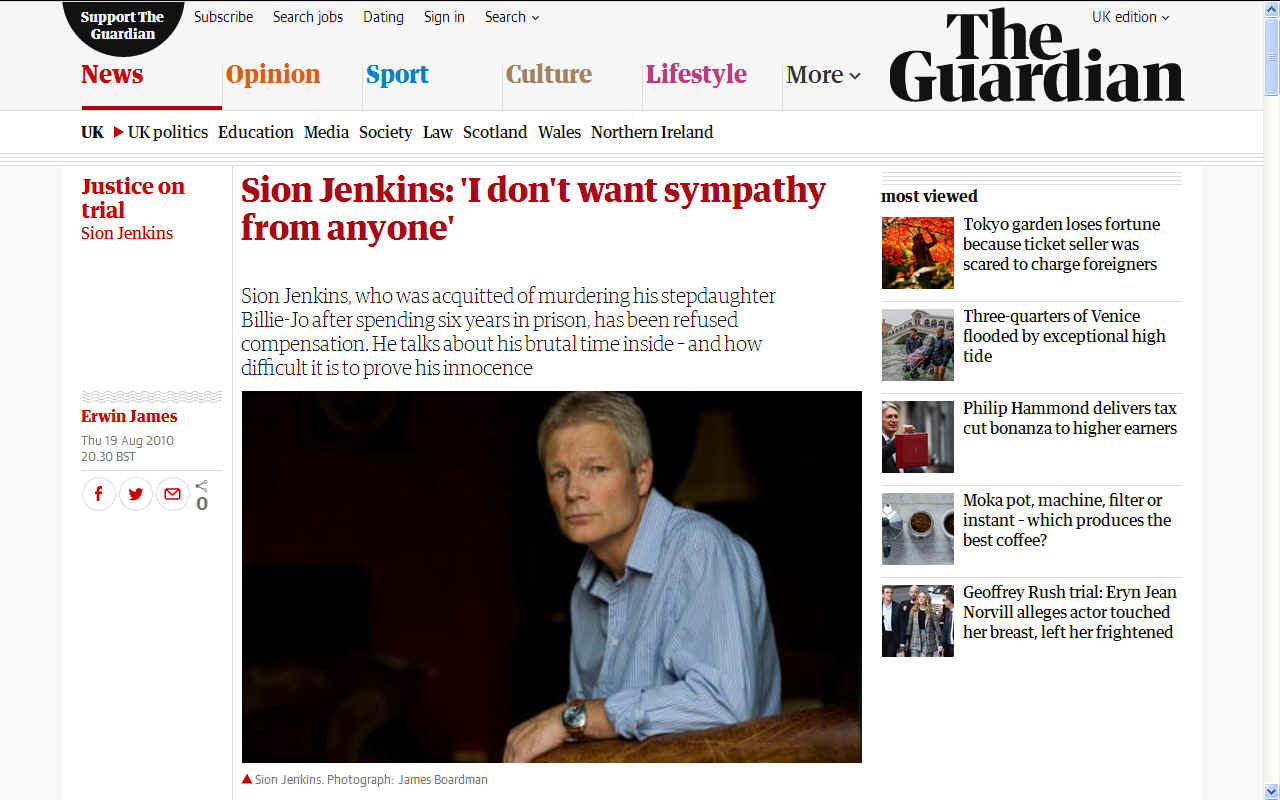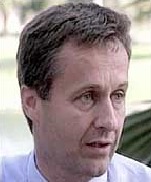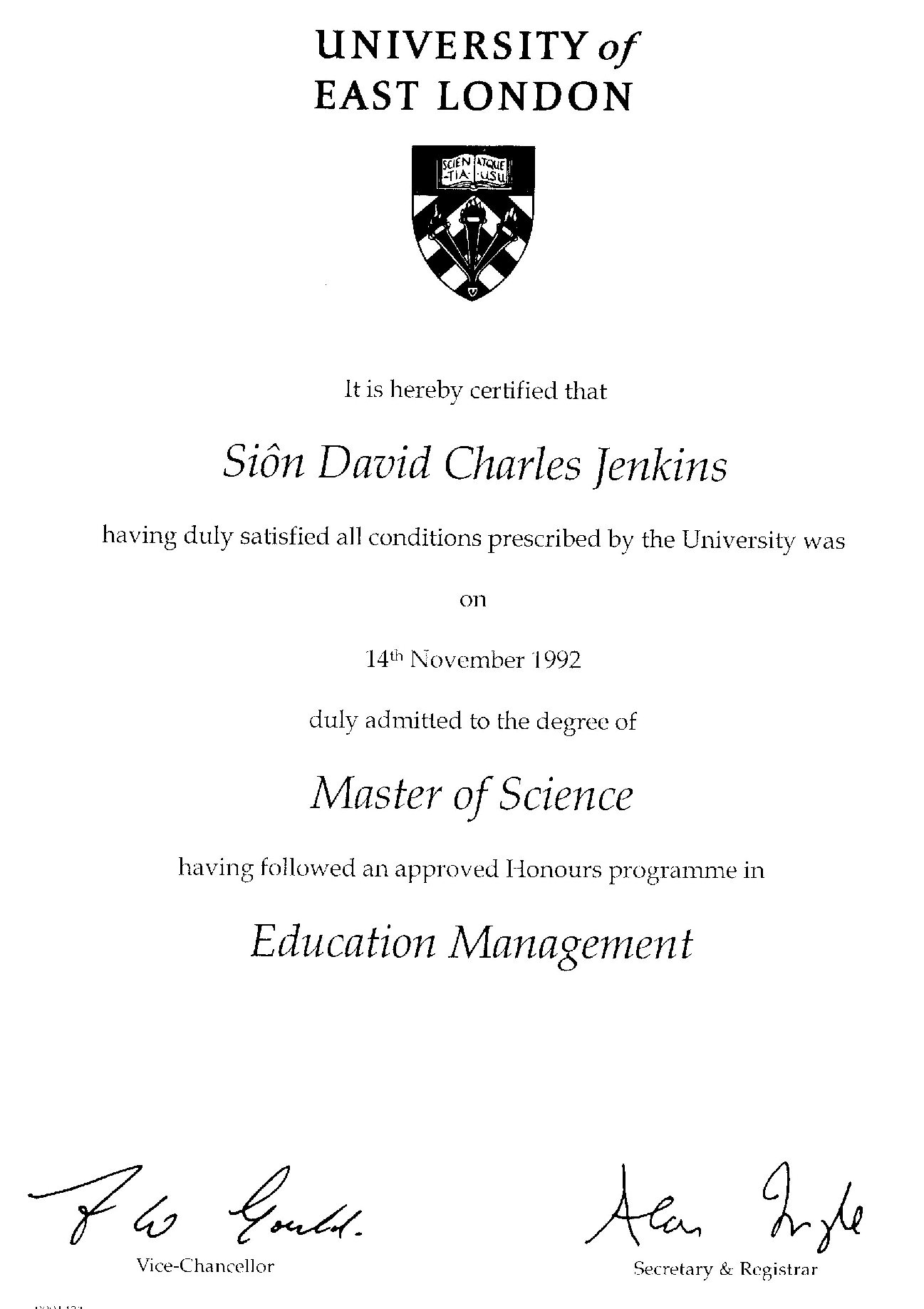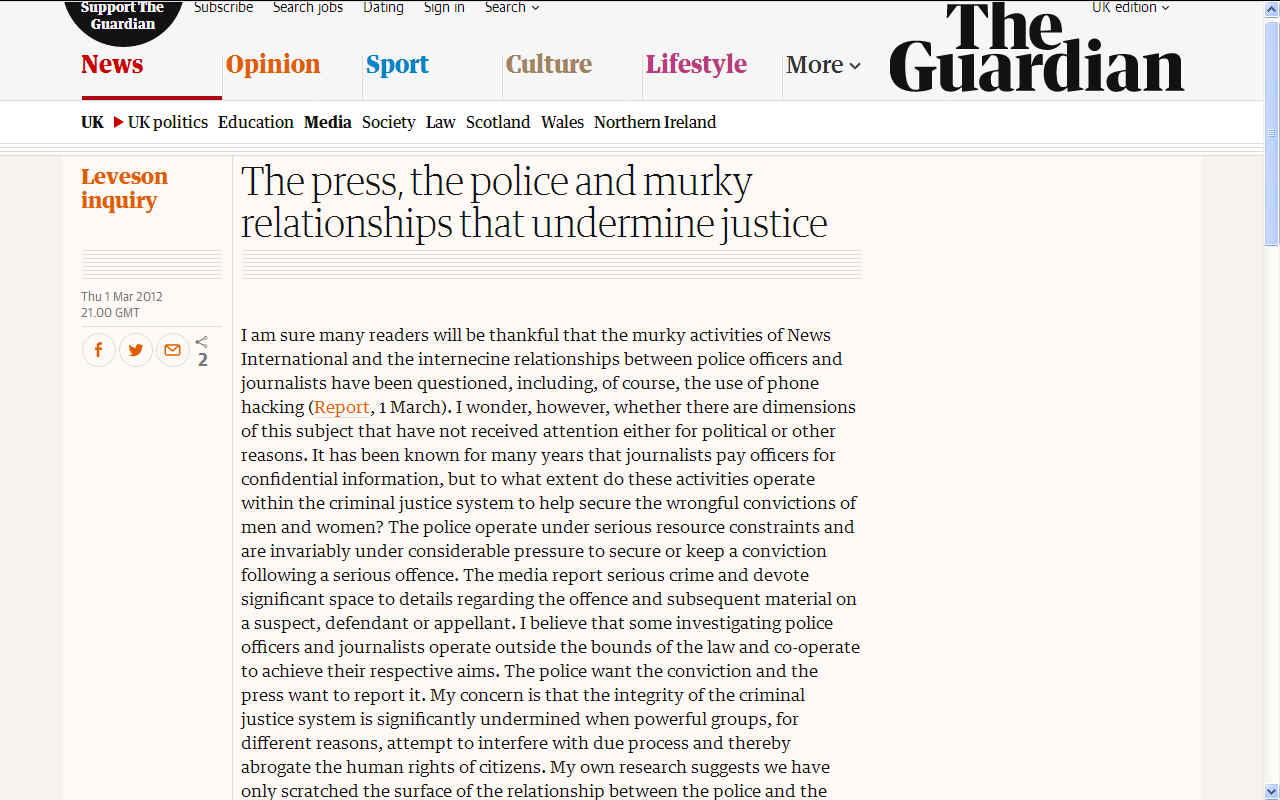|

THE GUARDIAN
19 AUGUST 2010
Sion Jenkins, who was acquitted of murdering his stepdaughter Billie-Jo after spending six years in prison, has been refused compensation. He talks about his brutal time inside – and how difficult it is to prove his innocence.
'How can I prove my innocence when the criminal justice system does not provide for proof of innocence?" Sion Jenkins is responding to the pronouncement last week by the Ministry of Justice that compensation awards for miscarriages of justice will only be paid in cases where there is "clear proof of innocence". We're sitting in the pretty garden of the home he shares with his wife Tina and stepson Oscar in Hampshire. He looks lean and fit and unusually youthful, given the extraordinary and extreme life experiences he has endured over the last 13 years.
In February 1997, Jenkins was convicted of murdering his foster daughter Billie-Jo, 13, and sentenced to life imprisonment, with a minimum term to be served of 25 years. Billie-Jo had been battered around the head with a metal tent peg at least nine times and left to die on the blood-spattered patio of the Jenkins family
home in Hastings, where she had been alone painting the patio doors.
The main evidence against Jenkins, indeed the only forensic evidence against him, were the 158 microscopic particles of Billie-Jo's blood that were found later on the fleece jacket he was wearing that day. His explanation was that he had found Billie-Jo lying unconscious on the patio floor, bent over her and then cradled her, and that as he did so Billie-Jo breathed out, sending out a fine spray of blood. The jury were out for two days before returning a unanimous guilty verdict. I ask if he'd anticipated that the original verdict might go against him. "No," he says firmly. "I was sure it was going to be an acquittal. But I didn't realise what standing in a dock could be like – that notions of innocent until proven guilty sometimes waver when it's a serious crime. The media decided on the narrative they wanted and stuck with it, regardless of other facts or truths.
"I never appreciated the extent of the role of the media in these things; how crime is reported and how people are presented, through photographs, through actions, through words. You realise you have an uphill battle – but I still believed I was going to be acquitted, and didn't prepare myself for anything else."
What went through his mind when the guilty verdict was delivered? "I didn't actually think anything. I was just so dumbstruck and shocked by what I heard. You hear it and you question whether you've heard it right. I can remember being taken down the stairs and being surrounded by some of the court officials. Two of the women were crying; they couldn't understand it. I know others probably said: 'I understand it.' But it was just very difficult to take in the things that were happening around me, and then being taken off."
I tell him a journalist colleague who sat through his original trial thought he was guilty, but had to admit the case was very thin. Was it the relative flimsiness of the evidence that gave him the confidence to expect an acquittal? "To be honest with you, I didn't think in those terms. I didn't think: 'Well, we've got evidence and they've got evidence.' It was simply: 'I haven't done this.' It wasn't a case of, you know, looking for ways of strengthening the case or attacking the prosecution. Now, when I reflect back, I can see that things could have been very different. One of the things I suppose I regret is not taking a more active interest in my first trial. I was very passive. But I wasn't ready to suddenly start fighting. It was all I could do to cope with the fact that Billie had been murdered."
Initially, Jenkins had been held on remand in Lewes
prison. It was there he had his first taste of so-called "prison justice". "Emotionally and psychologically, I could never have prepared for any of the things that happened to me. When I went into Lewes, I was still reeling from the shock of everything – and it was one shock after another shock after another. And then, after a period of time, a short period of time, I started to close down.
"On the prison landing, it was wild-west stuff. It was difficult. There was so much of what I hadn't experienced in life before. I had never been openly insulted. I hadn't been called names before. Other than in the primary school playground, I had never had a fight before. Then, one day, one of the prisoners decided he wanted to take out my eye with a pencil. There was a whole other dimension of life that I hadn't known existed and could never have prepared for. It was a great relief when I was given bail from
Lewes."
After his conviction, more than a year later, he was taken back to Lewes prison and then transferred to HMP Belmarsh in
London. If Lewes was difficult, Belmarsh was in another league. "My introduction to Belmarsh was very difficult. On the landings, I had a very, very difficult time. It was hostile, cold, utterly institutionalised, soulless. I went to take a bath and three people came into the bathhouse and tried to drown me. I fought for my life."
It was an experience, he says, that undermined his equilibrium and left him feeling "quite brutalised". Jenkins says he fell out with Belmarsh "in a big way" when his cell door opened one night and a prisoner who was due to be released the next morning was put into his cell for the night. "As soon as this man was released, he went straight to the
News of the World and sold them a story about my 'cell confession'. I got very angry and went to see the governor, and told him how disgusted I was that they should engage in this kind of behaviour.
"The next day, my cell door opened at six in the morning and I was whisked down to the segregation block, and put in a cell that was a total
shithole. It was filthy. People had gobbed phlegm all over the ceiling, there were fag-ends all over the floor. Somebody had obviously pissed 50 times on the mattress. I asked for my bag from my cell on the landing as I wanted to get the legal letters I had written the night before. When the bag arrived, the letters had all been taken.
"Some weeks later, another governor came and told me I was moving, and did I have any preference about where I'd like to go? I laugh now when I think about that. On the wing, some of the more reasonable prisoners told me I'd be going to a lifer's prison; they said whatever I do, don't go to Wakefield – otherwise known as Monster Mansion. So I told this governor: 'Anywhere but Wakefield.' When the time came for my move, they wouldn't tell me where I was going. They put me in a tiny sweatbox which had flaps over the windows so I couldn't see out. But a couple of hours into the journey, I heard on the cab
radio that I was on my way to Wakefield."
As difficult as it was, Wakefield turned out to be a lot better than either
Lewes or Belmarsh. "I kind of settled down and just tried to get on with it. I suppose everything for me was directed at getting back to the appeal court. I thought I wouldn't be staying there very long, and I was really confident. A Trial and Error documentary was broadcast. I thought the grounds of appeal were solid, and I believed totally, again, that I would get justice.
"I went down to the Royal Courts of Justice at Christmas, and remember looking through the window of the sweatbox at everyone carrying their Christmas shopping, and of course I thought of my own family. I started to think I could be out for
Christmas. And then they dismissed the appeal, I was back in a sweatbox and taken back to Wakefield. That was a really crap moment of my life. I got back to Wakefield late that night, everyone was banged up. I went down the corridor to my cell, and one of the two screws taking me said, 'Well done.' I said what are you on about? I'd lost my appeal. He said, 'We had bets on you losing. We've won a lot of money on you.'"
After Jenkins's appeal failed, his case was taken up by the
Criminal Cases Review Commission (CCRC), the body responsible for assessing all cases where there may be grounds for a further appeal. "I had an extraordinary caseworker called Dawn Butler. She worked tirelessly to find the evidence that was to lead to me being sent back to the court of appeal – and she actually had
cancer. I suspect she knew she was going to die, but she continued to work and labour for me. I never met her personally, but she corresponded with my legal team, leaving no stone unturned, and showed such integrity, resolve and diligence. Everything you would want from somebody when, if it were not for that person, you knew you would probably die in prison."
Butler did die before Jenkins won his freedom. Did he regret not being able to acknowledge her efforts in person? "Oh, yes," he says, "absolutely. And just to show you the coincidences of life, I was sat in a cell in Wakefield listening to Classic FM. My family had put in a request for a piece of Beethoven and, in the same show, somebody had put in a request for Dawn Butler. Can you believe that?"
Finally, in May 2003, his case was sent back to the Court of Appeal; in July the following year, his conviction for murdering Billie-Jo was quashed and he was given bail. "My getting bail was very, very important. At least it allowed me to hear and see what my legal team were doing for me. Because I'd been given bail before the first trial, it meant the judge could give me bail the second time and I walked out of Belmarsh. So then, when I was preparing for the appeal and subsequent retrials, at least I did it from the perspective of somebody who wasn't incarcerated. I was in prison for six years, and it was good to be out. I was a very different man – much stronger. When I saw those electronic gates moving and I was able to walk through, it was quite a momentous moment."
Jenkins's second trial began in April 2005. It resulted in a hung jury, and the
prosecution immediately announced it would be seeking a further retrial. His third and final trial began in October the same year, and lasted for three months. Again the trial ended with a jury unable to decide on a verdict, and on 9 February 2006, Jenkins was formally acquitted. Two years later, he applied for compensation for wrongful conviction and six years of imprisonment.
"Just to be clear about this, I was actually declined compensation over two years ago. So why this should have become an issue now is a mystery," he explains. "But in any case, I think the Ministry of Justice needs to get its thinking straight, bearing in mind the criminal justice process has no means of providing for proof of innocence. Appeal court judges are not looking to see if the appellant is innocent or guilty, but simply if the verdict is safe or unsafe."
The rules determining eligibility and levels of compensation for people wrongly convicted by the courts changed dramatically in April 2006. Until 1988, the process for people claiming to have been victims of miscarriages of justice was to apply to the home secretary, who could use his discretion as to the appropriate level of an award. Then, under the Criminal Justice Act of 1988, a statutory scheme was introduced whereby compensation would only be paid when a "conviction has been reversed or [a person] has been pardoned on the ground that a new or newly discovered fact shows beyond reasonable doubt there has been a miscarriage of justice".
Finally, in April 2006, the then home secretary Charles Clarke announced further changes to the statutory scheme, drawing comparisons with the often derisory compensation offered to victims of crime. He reduced the legal aid payment for work on compensation cases to the lowest category, and imposed a six-month time limit on the provision of evidence supporting a claim. He also said the assessor would take greater account of previous convictions and acts contributing to the conviction, and brought in a
£500,000 cap on payments.
The civil liberties specialist Susie Labinjoh calls the current situation "utterly ridiculous". She says it is blatantly unfair to put the burden of proof of innocence on an appellant. "Its a huge burden," she says. "Ever since 2006, the Ministry of Justice has decided to interpret case law on this issue more and more narrowly. The state has all the power and resources to pursue a case against a defendant, who has very limited resources. Rejections for compensation are happening all the time because of this draconian attitude. People need to know just how unfair this interpretation of the scheme by the
Ministry of Justice is."
Meanwhile, Jenkins has decided not to pursue any other actions for compensation. But his experiences are never far from his mind. "I still dream about being in prison, and often find myself thinking about all that had happened. I don't think I will ever be able to put what happened behind me. But I don't want sympathy from anyone. Compared with many victims of miscarriages of justice, I have a good life."
Jenkins has taken a masters in criminology and criminal justice, and a masters in social research and methodology, in preparation for a PhD. "I'm in my final year of my doctorate, and I'm enjoying understanding more and more about my case and what happened to me. I want to be able to use what I have learned to help other people who go through the miscarriage-of-justice experience."
Latest
comment
Mr
B
A
Call to Action
The
Wife’s Story
Justice
Delayed
The
Facts of the Case
Jeremy
Paine
The
Outcome
The
Police
Archive
The
Legal Process
Using
the Site

BBC1
DRAMA
On
18 January 2000, BBC1 screened a docu-drama showing how the police used
forensic evidence to convict Siôn Jenkins of murder.
The
forty minute programme revealed little scientific detail to justify the
eventual outcome of the case. If it was a faithful record of how the
investigation was actually conducted, the programme clearly demonstrates
that decisions were made not on the basis of reason or deduction, but
according to the opinions of two individuals — Jeremy Paine and
Adrian
Wain.
The
story was presented in the style of a police drama.
Events were depicted to evoke emotion, and for effect rather than for
accuracy.
The
scene portraying the discovery of blood spattering on Siôn Jenkins’
clothing is followed by a shot of Adrian Wain describing his surprise,
“knowing who he was and what his position was”. Wain makes clear that
from this point he assumed the murderer to be Siôn Jenkins.
Viewers
are then told that Jeremy Paine became ‘convinced’ that Siôn Jenkins
must have killed Billie-Jo.There is nothing to show the evidence on which
his certainty was founded.
It
seems that from this stage, not long after the murder, being able to
charge Siôn Jenkins with murder became the main focus of police
efforts.
Wain
states in the film: “There were huge pressures on me to provide an
answer one way or the other”. It was evidently made clear to Hastings
police that they had two weeks to produce ‘the evidence the CPS asked
for’
In
effect, they were shaping the evidence to fit their hypothesis.They were
not looking for objective proof.
At
this stage the film showed two excited detectives discussing the discovery
of Siôn Jenkins’ falsified CV. They agreed that they could now charge
him with obtaining pecuniary advantage by deception. This event was
presented as a momentous turning point for the prosecution.
The
film clearly demonstrated that the discovery of the falsified CV was a key
factor in confirming the police view that Siôn Jenkins was guilty of
murder.
This
was an illogical connection, but one which proved to have drastic
consequences.

(SO
CALLED) FORENSIC EVIDENCE
Adrian
Wain spoke about his experiments with a pig’s head and a leg of pork.
Blood was applied to the surfaces before they were battered by Wain. The
findings from this activity provided apparently compelling proof of Siôn
Jenkins’ guilt.
At
appeal the rigorous scientific evidence offered an alternative explanation
which was acknowledged as ‘relevant’ and ‘credible’.
When
Siôn Jenkins was granted bail police outrage was intense. In the film
Jeremy Paine openly reveals his contemptuous view that it was only granted
because Siôn Jenkins was “middle class and respectable.”
Personal
prejudice is an unreliable basis for police activity.
Over
the year leading up to the trial, police are described as reconstructing
the details of what took place. Jeremy Paine and Ann Capon are depicted at
the scene of the crime, speculating on how events unfolded. In the garden
of the Jenkins home, Paine comments that the tent peg would be ‘the
nearest weapon to hand.’
At
the appeal it was pointed out that other potential weapons would have been
much nearer to someone actually inside the house, as Siôn Jenkins was
known to have been.
As
the programme approaches its close Jeremy Paine gives his view of what he
judges to be Siôn Jenkins’ arrogance in refusing to admit to having
killed Billie-Jo. In talking about how Siôn Jenkins reacted on finding
Billie-Jo, he confidently asserts that this behaviour was not “what you
or I would have done”.
How
can anyone know what they would do in such a traumatic circumstances? How
likely is it that anyone would actually — as Paine suggested — cradle
in their arms a victim with the horrific injuries Billie-Jo suffered?
In
the film, shots of police building up their hypothesis alternate with
shots of the narrative they are creating. The borders between reality and
fiction are blurred by this technique.
This
film was made with the explicit co-operation of Hastings
police. If it gives a true account of their work it is no wonder that
there is still enormous disquiet about the result it achieved.
‘Trail
of Guilt’ trivialises a tragedy. In the light of the retrial verdict, it
provides a revealing insight into the background to the original trial,
and what is meant by justice in Britain
today.
.
.

I am sure many readers will be thankful that the murky activities of News International and the internecine relationships between police officers and journalists have been questioned, including, of course, the use of phone hacking (Report, 1 March). I wonder, however, whether there are dimensions of this subject that have not received attention either for political or other reasons. It has been known for many years that journalists pay officers for confidential information, but to what extent do these activities operate within the criminal justice system to help secure the wrongful convictions of men and women?
The police operate under serious resource constraints and are invariably under considerable pressure to secure or keep a conviction following a serious offence. The media report serious crime and devote significant space to details regarding the offence and subsequent material on a suspect, defendant or appellant. I believe that some investigating police officers and journalists operate outside the bounds of the law and co-operate to achieve their respective aims. The police want the conviction and the press want to report it. My concern is that the integrity of the criminal justice system is significantly undermined when powerful groups, for different reasons, attempt to interfere with due process and thereby abrogate the human rights of citizens. My own research suggests we have only scratched the surface of the relationship between the police and the media. What saddens me is that I believe this relationship has led to the wrongful convictions of many people, and all because individual police officers and journalists chose the easier and unjust option.
Dr Sion Jenkins
.
.
SUSSEX
POLICE A
- Z OF OFFICER INVESTIGATIONS
Aran
Boyt
Chris
Sherwood
Colin
Dowle
Dave
Tye
Jane
Rhodes
Jo
Pinyoun
Joe
Edwards
Giles
York
Gordon
Staker
James
Hookway
Kara
Tombling
Keith
Lindsay
Keith
Stoneman
Ken
Jones
Maria
Wallis
Mark
Jordan
Martin
Richards
Neil
Honnor
Nigel
Yeo
Olivia
Pinkney
Paul
Whitehouse
Peter
Coll
Robert
Lovell
Sarah
Jane Gallagher
Sir
Ken Macdonald QC
Timothy
Motram
LINKS
https://www.theguardian.com/uk-news/2013/dec/13/man-wrongly-convicted-sexual-assault-freed-17-years
http://www.justiceforsionjenkins.org.uk/
https://www.theguardian.com/uk/2010/aug/19/sion-jenkins-billiejo-murder-acquitted-compensation
https://www.theguardian.com/media/2012/mar/01/press-police-relationships-undermine-justice
|



